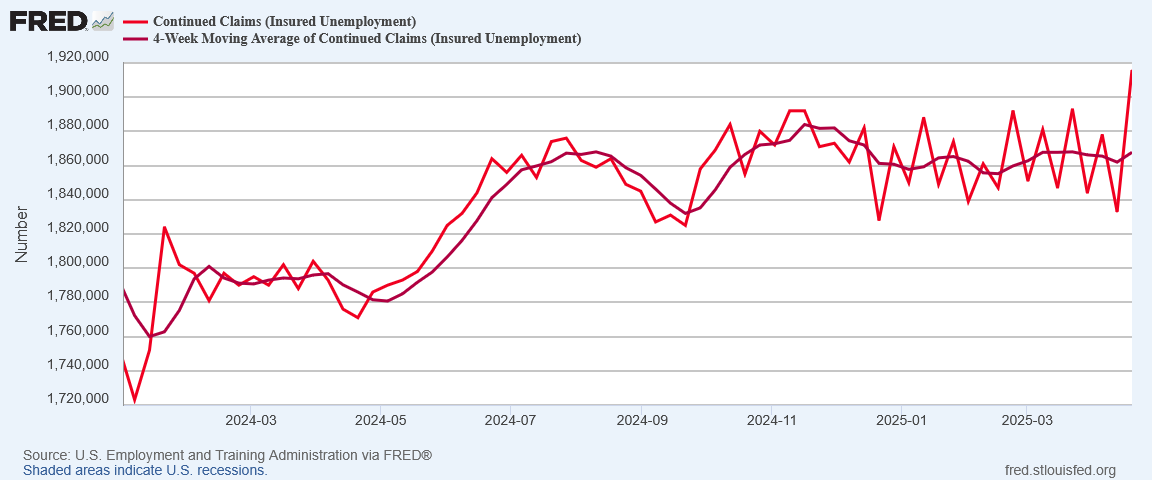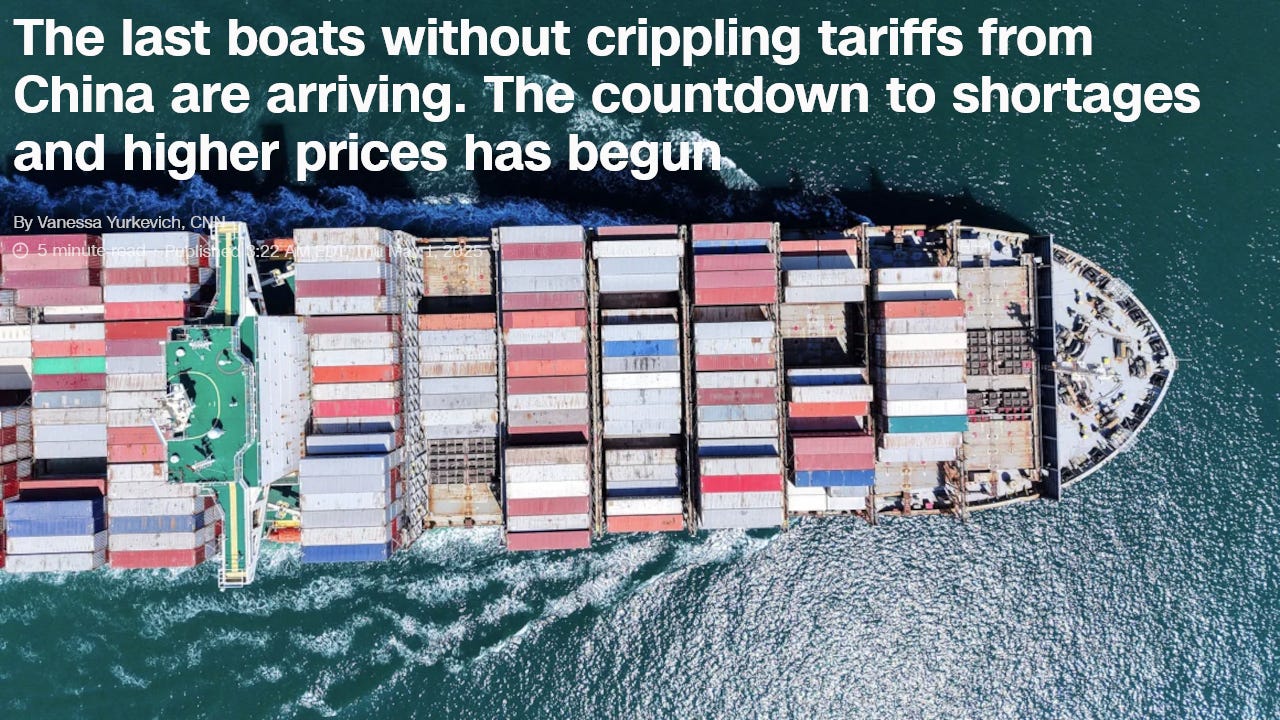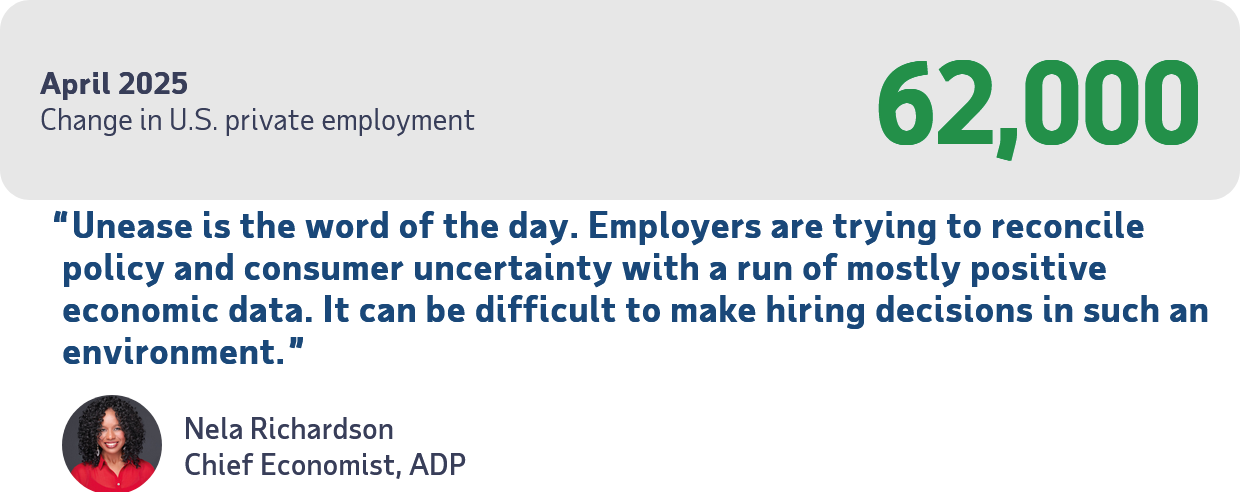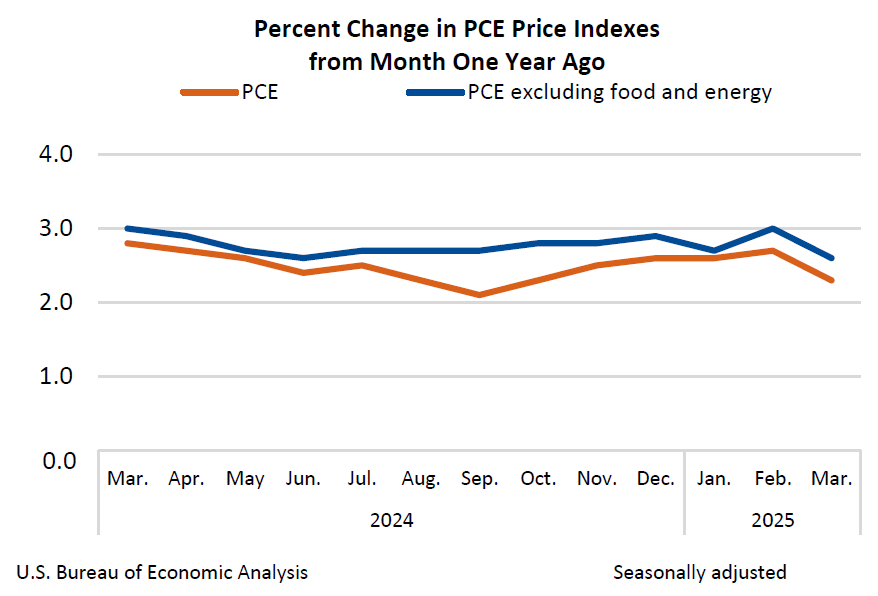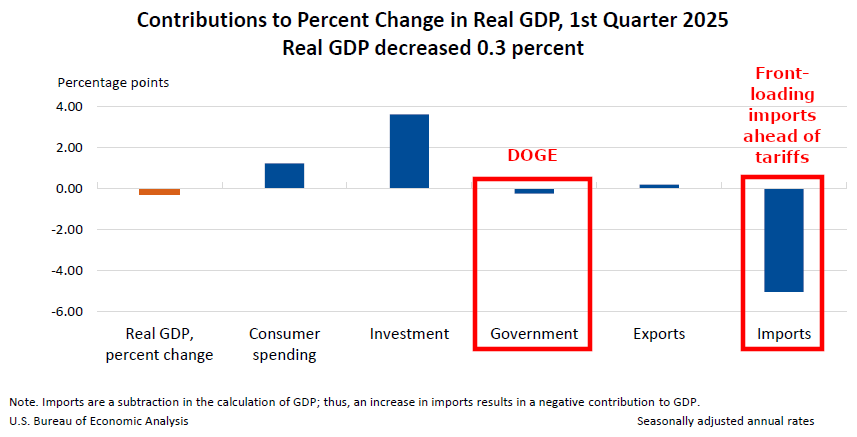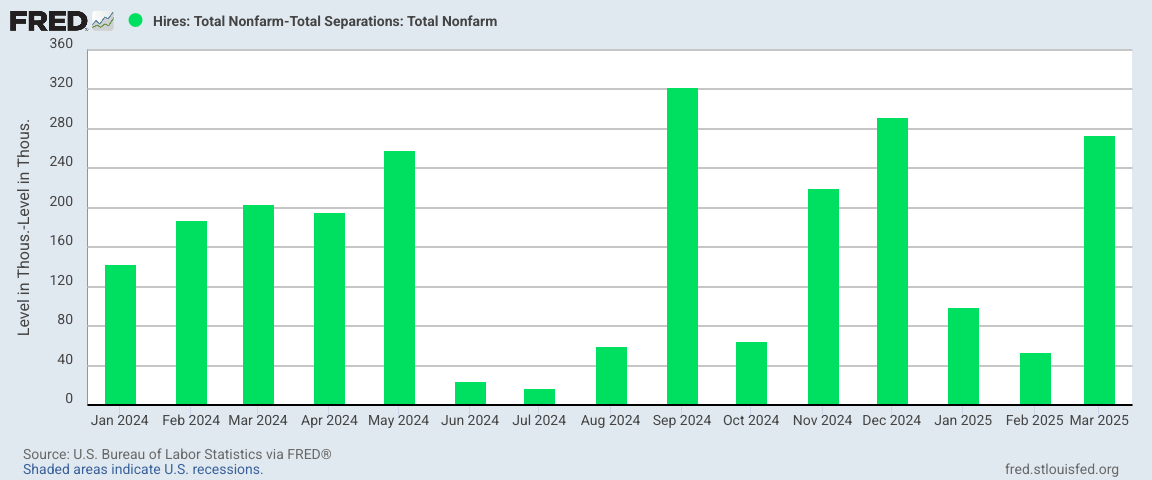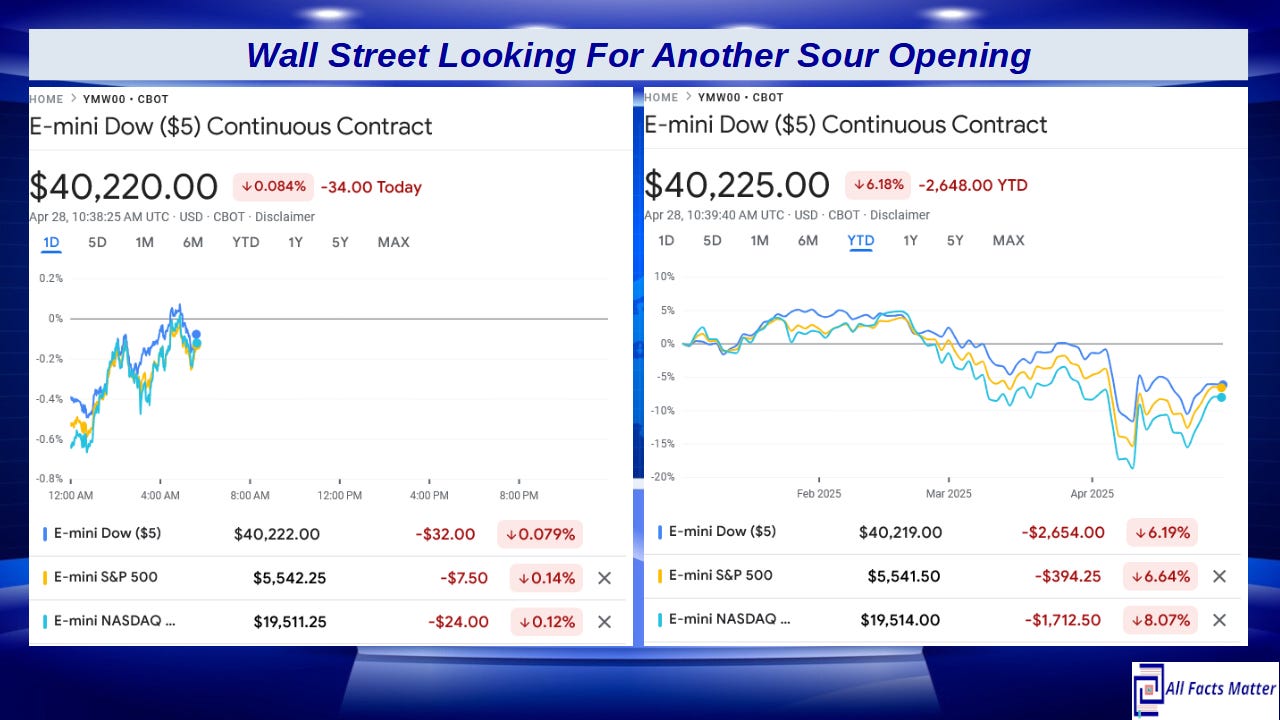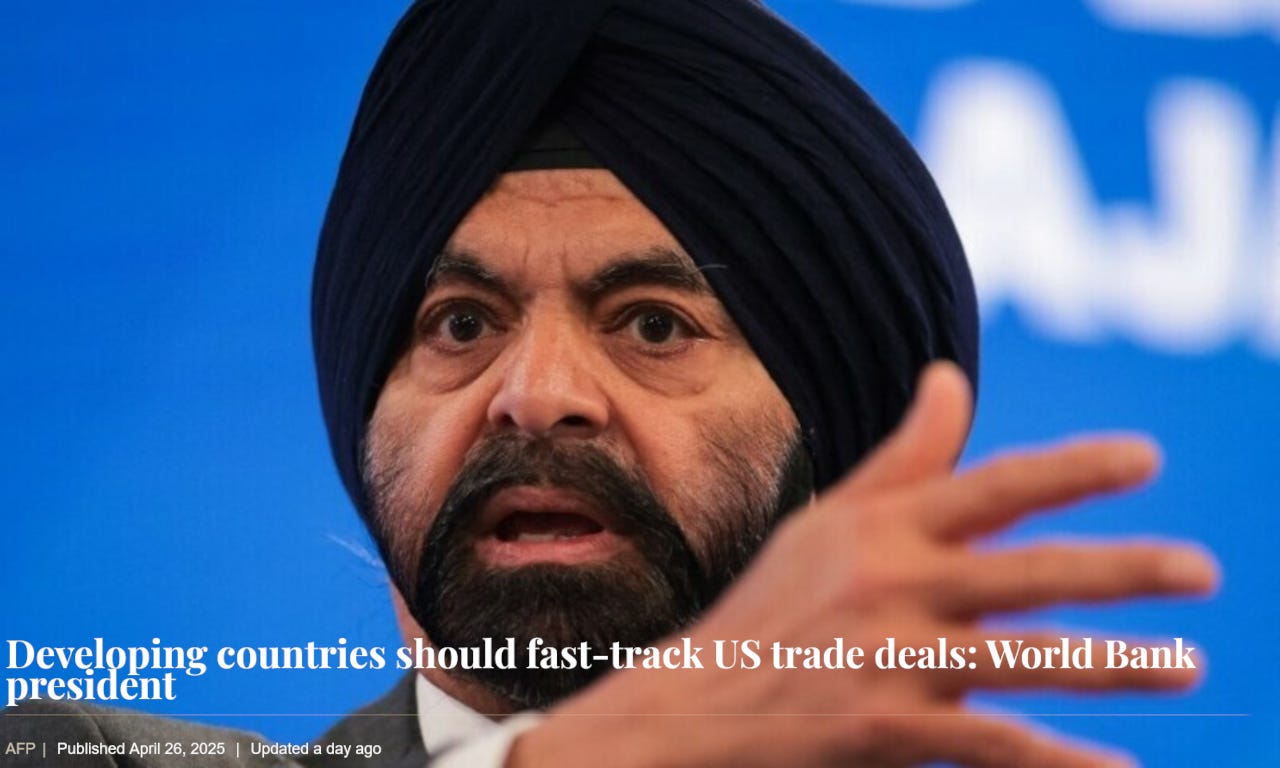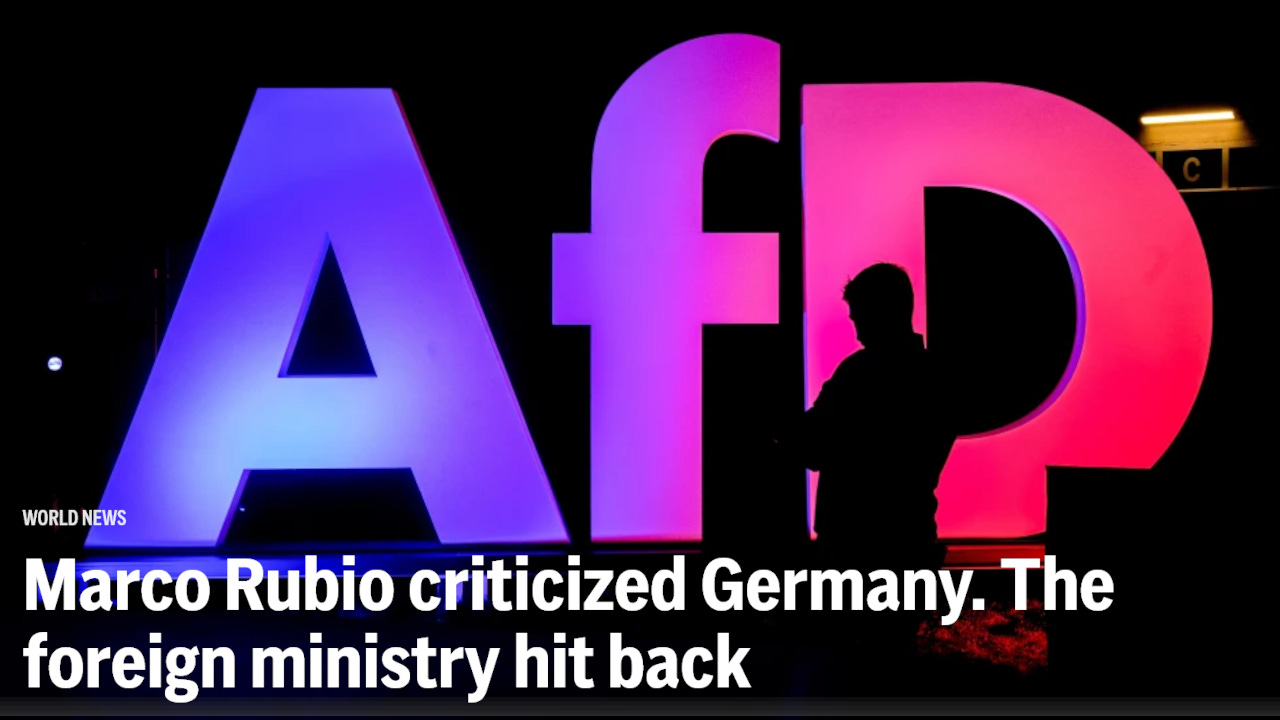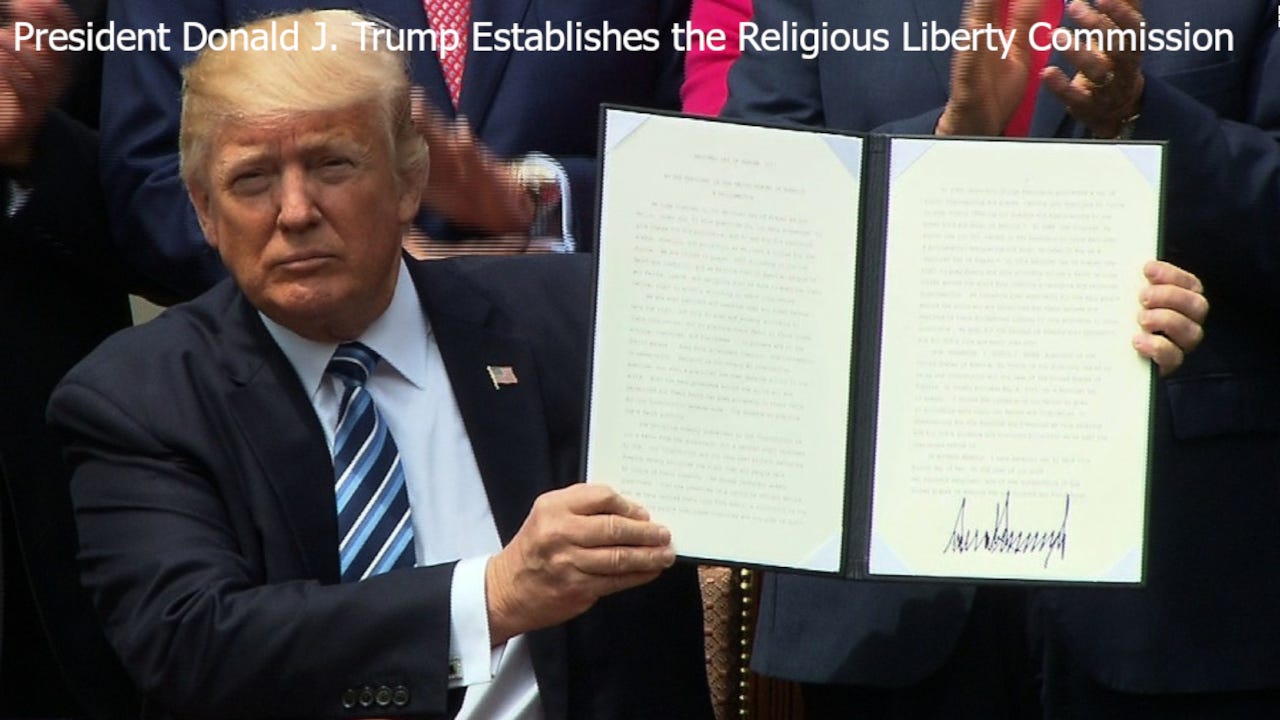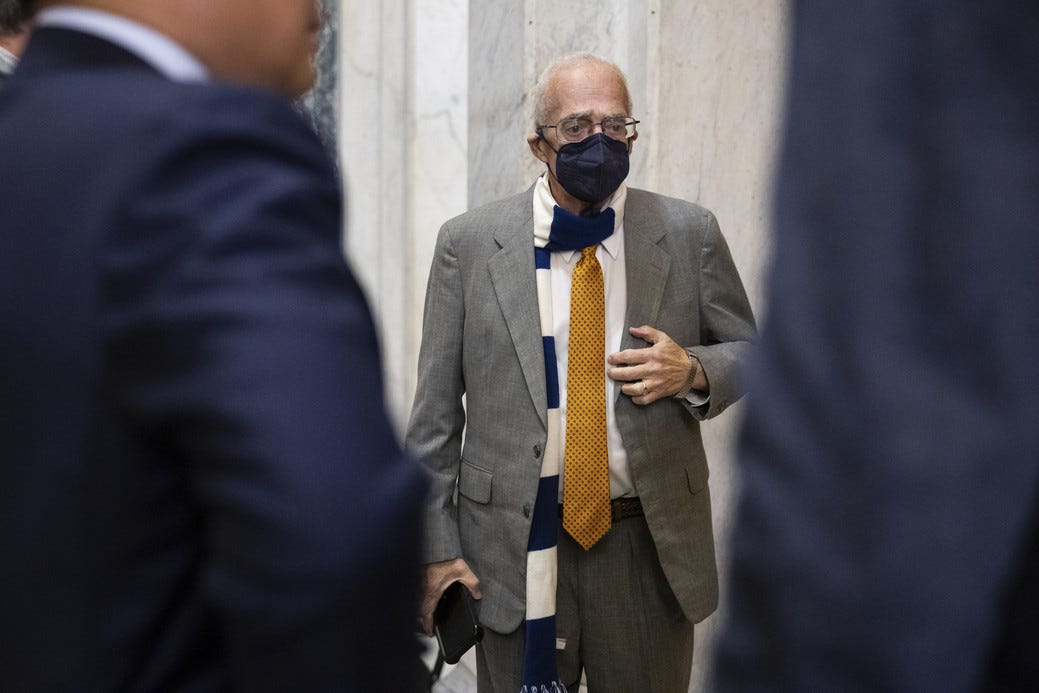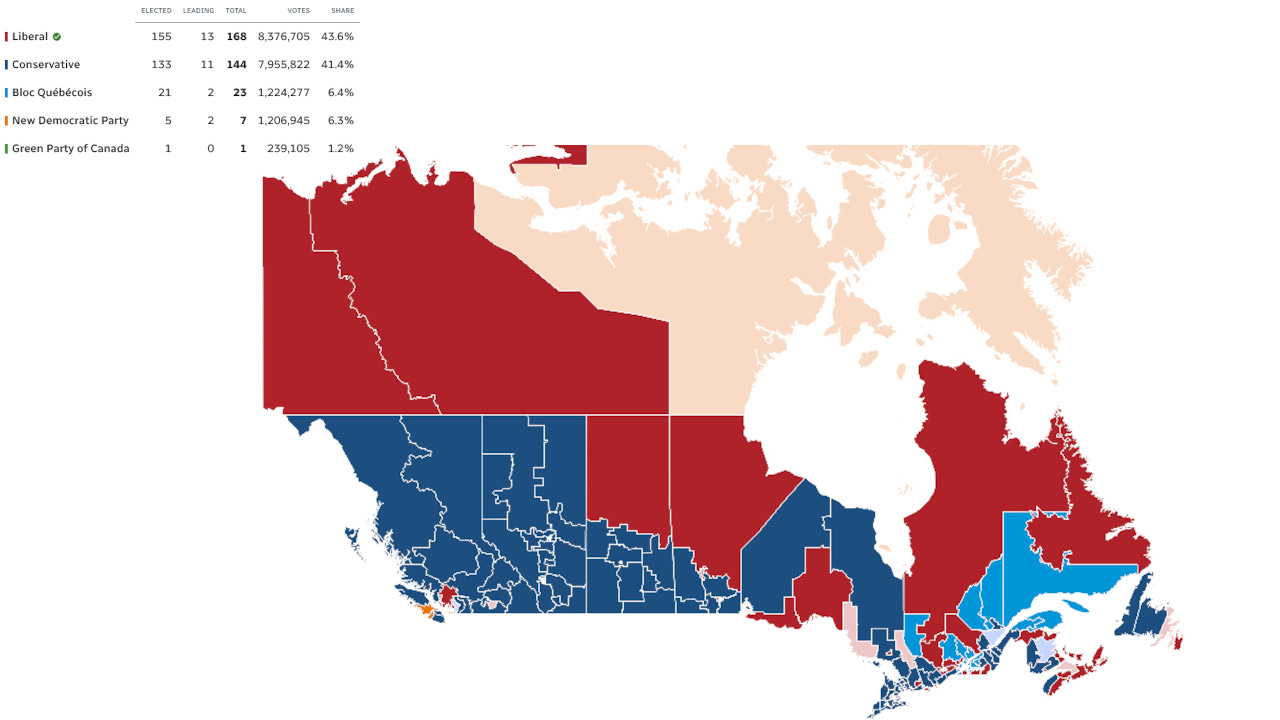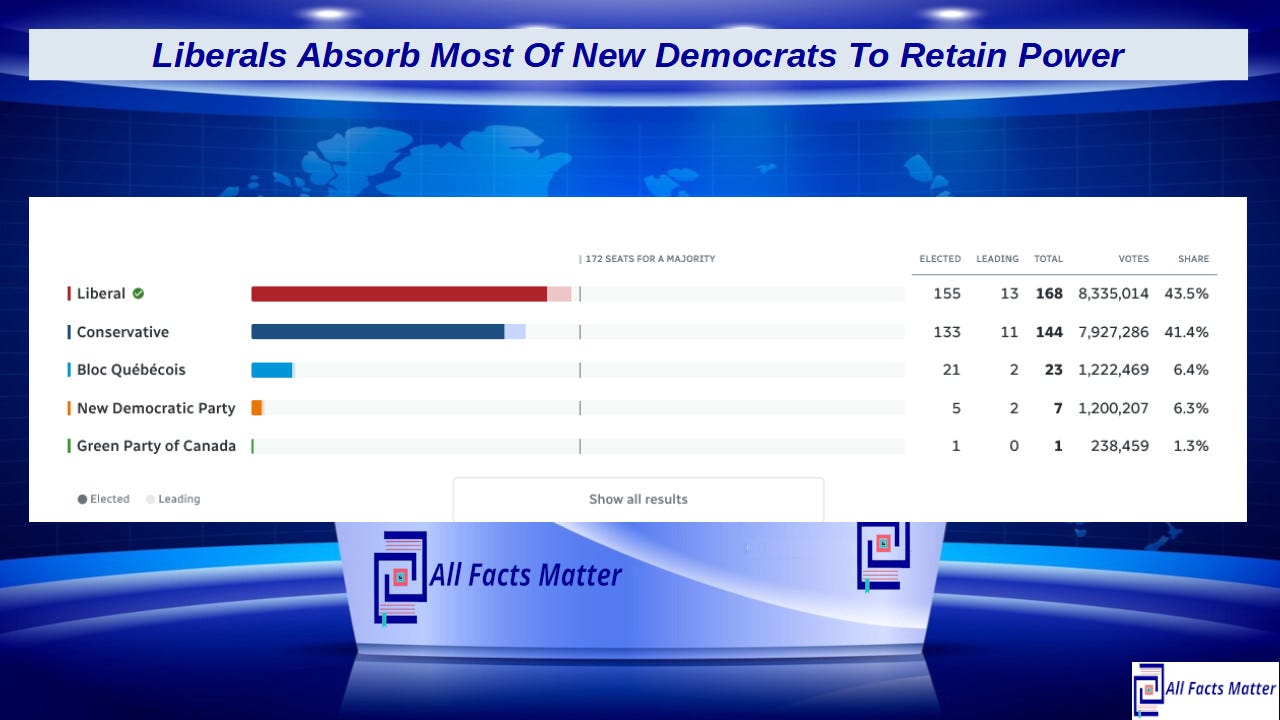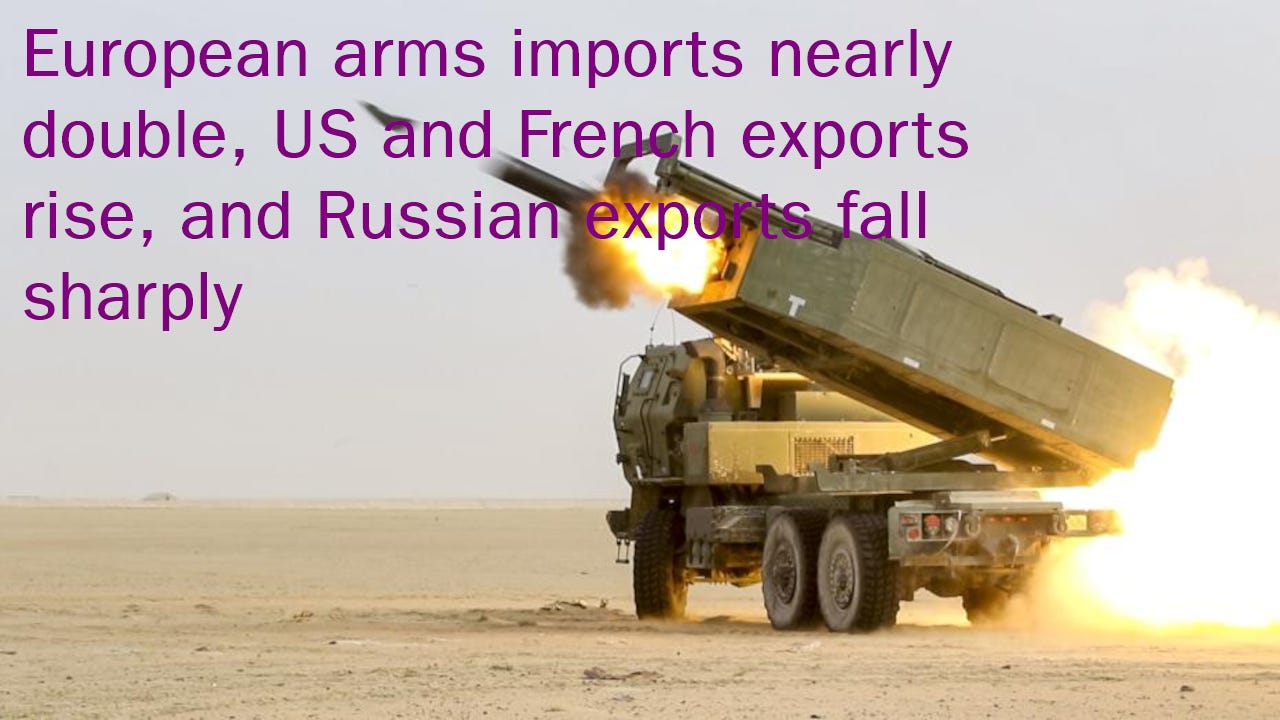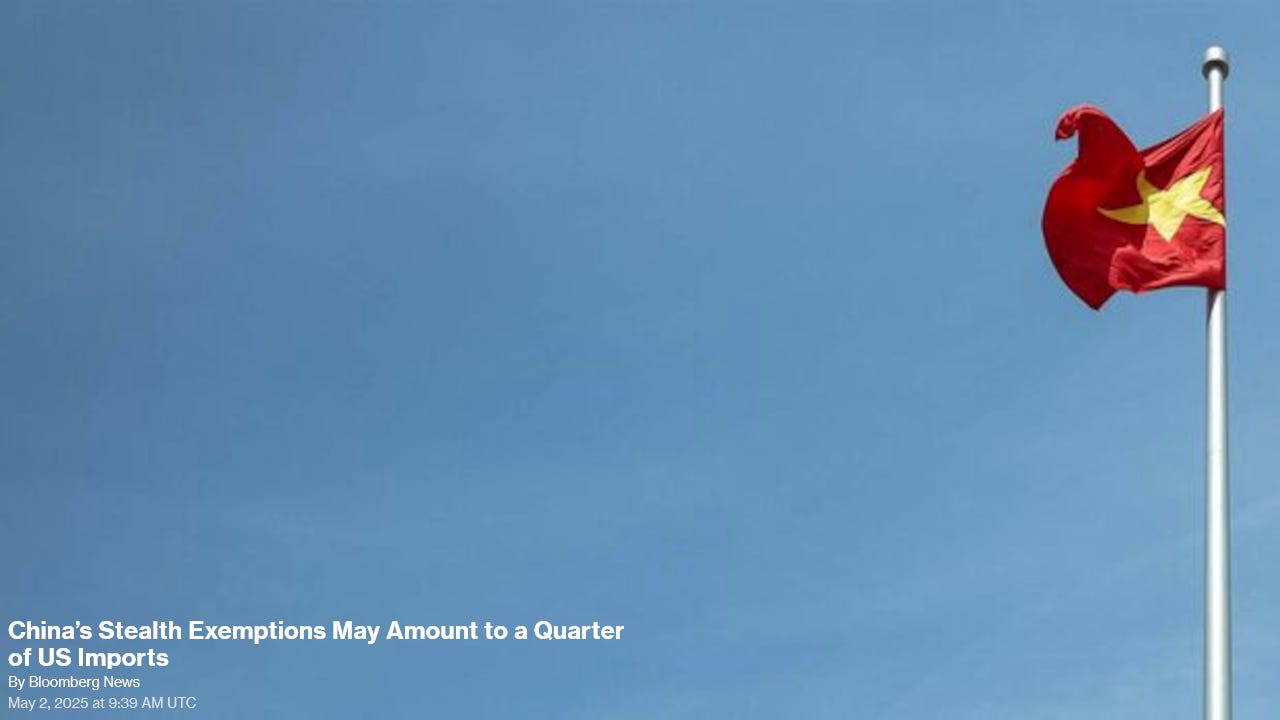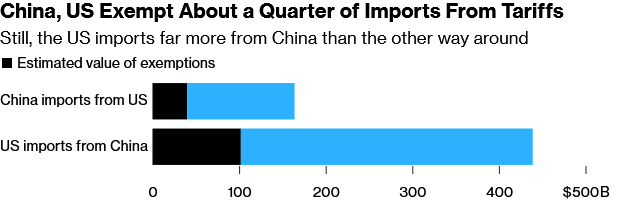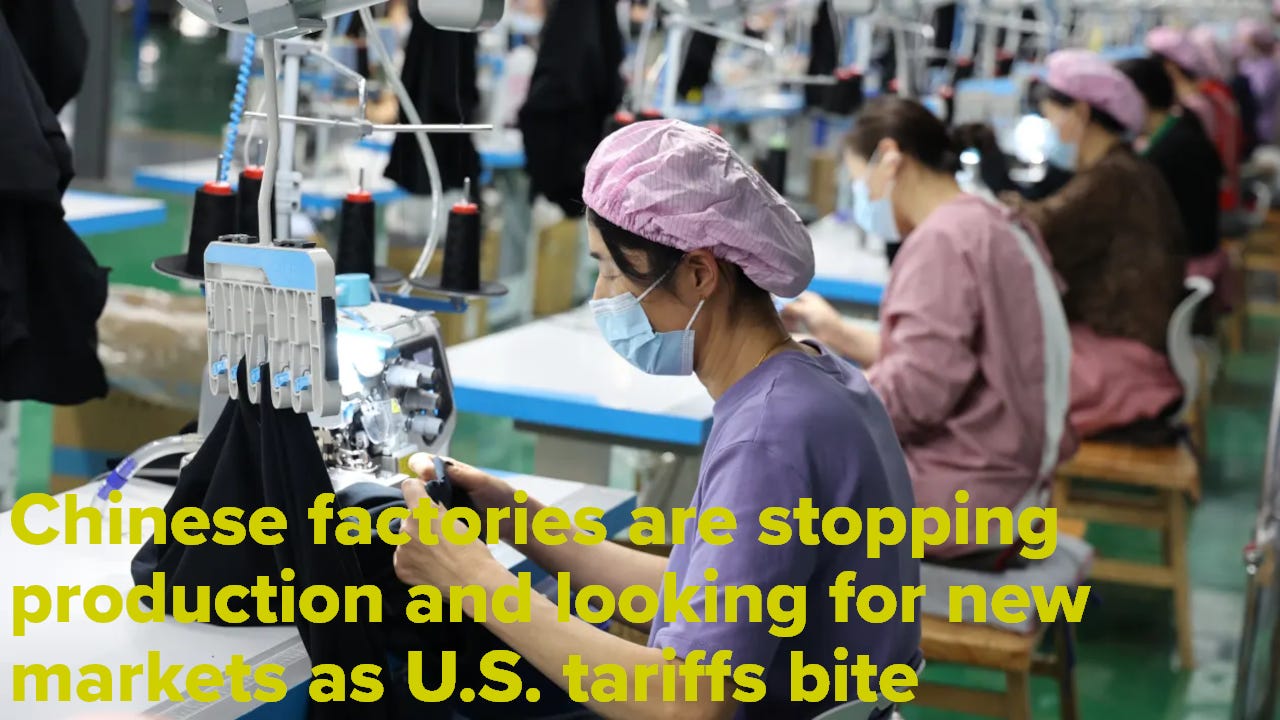Brief News Matters
News Briefs For The Week Of 27 April 2025
Economic News
Tariff Deflation?
(2 May 2025) Oil prices were already on a long-term downward trend when Donald Trump announced the Liberation Day tariffs one month ago.
Since that announcement oil prices have dropped dramatically. The initial plunge was clearly catalyzed by the tariff announcement, but—unlike the stock market—there was only a margine recovery in price before a downward trend resumed over the past ten days.
Energy prices have long been a major driver of price inflation for a variety of consumer goods, and the story of energy prices for 2025 is one of deflation. The Liberation Day tariffs appear to have amplified that story considerably.
Does this mean that the tariffs are proving to be a catalyst for consumer price deflation rather than inflation? Is President Trump on the verge of actually delivering lower prices as he promised on the campaign trail last year?
Energy prices seem to be indicating exactly taht.
Apocalypse Later
It has been a full month since the “Liberation Day” tariffs were announced, and Wall Street has completely rebounded from the shock and awe of a President doing exactly what he said he would do.
The final nudge to push the S&P and NASDAQ back into positive territory was Rumor Control suggesting that Beijing was ready to negotiate on trade.
Meanwhile, corporate media continues to push the narrative that without China people will have nothing to buy and stores will have nothing to sell.
Once again, the reality is proving to be more than a little bit different from corporate media’s narrative.
Unemployment Rising
(2 May 2025) Not all of today’s job news is good. Initial unemployment claims rose last week by 18,000, to a total of 241,000.
Continued claims also rose by 83,000.
The four-week moving averages for both initial and continued claims moved upward. More people are out of work—and remaining out of work—than before.
However good the April Employment Situation Summary reads, the unemployment numbers tell us that it is not good enough to end the jobs recession we have endured for over a year.
177,000 Jobs Created
(2 May 2025) The Bureau of Labor Statistics provided yet another strong jobs report in the April Employment Situation Summary. Per the BLS, it estimates that 177,000 jobs were created in April—nearly three times the number of jobs reported by ADP for the month.
Other top level numbers were also positive:
Employment level rose.
Employment-population ratio rose.
Unemployment rate held steady (unemployment level did rise by 82,000).
Not In Labor Force demographic declined.
The top level numbers are good. Are they “too good”? Given the BLS’ predilection for Lou Costello Labor Math in the past, do these numbers stand up under close scrutiny?
Full analysis to follow, where I’ll tackle that question head on.
CNN The Prophet Of Inflationary Doom?
(1 May 2025) CNN leaves no doubt where they stand when it comes to the Trump Administration’s policies.
Tariffs are bad, tariffs are going to cause massive shortages and inflation. Tariffs are going to cause China to win the trade war.
CNN does not go quite so far as to bleat “China good, Trump bad”, but they only just avoid that level of Orwellian sycophancy.
What will be the impacts on the US economy? Good question.
CNN reports that sailings from Shanghai to the US fell 60% in April. That is a steep drop in traffic by any measure.
But CNN also reports an upsurge in East Coast shipping traffic from Vietnam and Malaysia, and US importers are looking to source goods from countries other than China.
Will there be price hikes? Yes, but to what degree remains unclear.
Will their be product shortages? Yes, but to what degree remains unclear.
Will the economic dislocation be as bad as CNN predicts? I do not know…and neither does CNN.
ADP Prints Another Weak Jobs Report
(30 April 2025) The prelude to Friday’s upcoming April Employment Situation Summary, the ADP National Employment Report, showed another month of relatively weak job growth. 62,000 jobs added in April is less than half of the ADP number reported in March, and considerably less than the BLS number for March.
The ADP National Employment Report has been printing significantly weaker jobs numbers than the BLS Employment Situation Summary for the past several months. If current trends hold, April is likely to be yet another such month.
Will the BLS data track close to the ADP data when it comes out, or will the two employment series diverge yet again?
What is the actual employment trend in this country, and is it getting better or worse?
Disturbingly, the answers are not at all clear.
PCE Shows Further Disinflation With A Touch Of Deflation
(30 April 2025) Concurrent with the BEA’s GDP print is their monthly inflation print, the Personal Income and Outlays report.
On the month, year on year consumer price inflation moved lower to 2.3%, with the month on month numbers actually printed marginal deflation (< 0.1%). Consumer spending on energy led the decline, with energy spending dropping by nearly $30 billion.
The White House naturally is touting the lower inflation print as part of its “Promises Made, Promises Kept” social media campaign to mark President Trump’s first 100 days in office. Whether that lower inflation figure will hold in the face of fallout from the Liberation Day tariffs and subsequent trade war with China remains very much the unanswered question.
The Economy Shrank In The First Quarter? Really?
(30 April 2025) The big economic news today is that the economy contracted during the first quarter of 2025, with real GDP shrinking by 0.3pp, according to the Bureau of Economic Analysis.
Corporate media is, of course, leading with that as the headline. What corporate media is not explaining is that consumer spending grew in real terms, investment grew in real terms, and exports grew in real terms.
What contracted was government spending. Also, there was a flurry of import activity—most of which can be attributed to businesses front-loading anticipated future imports in an effort to get ahead of the Liberation Day tariffs (which President Trump had been telling everyone would be coming since before the election). Imports are treated as a reduction to real Gross Domestic Product, and so an increase in import activity is regarded as a decrease in the overall economy.
Between front-loading and the impact of tariffs, the surge in imports during the 1Q is almost certain to lead to a drop in imports during the 2Q. Just as a rise in imports is treated as a reduction in the overall economy, a decrease in imports will be treated as an expansion of the overall economy.
As for whether slashing government spending is an economic negative or positive is an assessment I leave to the reader to assess on their own.
Hires Tick Up. Separations Move Down
(29 April 2025) While Job Openings declined, Hires rose a marginal 41,00, according to the March Job Openings and Labor Turnover Summary. However, the important number for the month was the Total Separations, which declined by almost 180,000.
On the strength of the decline in separations, net hiring for March rose by 220,000, to 274,000, according to the JOLTS data.
While a rise in hiring generally positive, that most of the month’s increase was due to a reduction in separations gives the increase a defensive aspect. People are reluctant to leave the job they have, and employers are reluctant to lose the workers they have. While this is a measure of firmness in labor markets, it does not bode well for future job growth expectations.
Texas Manufacturing Plummets
(28 April 2025) Manufacturing took another hit with April’s Texas Manufacturing Outlook Survey, courtesy of the Dallas Federal Reserve. The general business activity index fell 20 points to -35.8, its worst level since May of 2020, at the height of the COVID Pandemic Panic. New orders dropped to -20, and capacity utilization dropped to -3.9.
In multiple dimensions, Texas manufacturing decreased during the April survey.
Future expectations are muddled. Future production expectations are still positive, while future general business activity expectations are negative.
A turnaround in Texas is needed if President Trump is to fulfill his Agenda 47 promise of making the US a “manufacturing superpower”
Wall Street Looking For Another Sour Opening
(28 April 2025) Stock futures are pointing to another down day to start the trading week.
Despite the negative sentiment, the Liberation Day tariff announcement was itself one of the smallest contributors to Wall Street’s gloominess. Markets began pricing in a decline weeks before the tariffs themselves were announced.
The markets are not on the verge of collapse but they are very much heading into correction territory on the year. The NASDAQ might cross that threshold as early as this week.
Wall Street more and more appears to be heading into a financial recession to match the jobs recession Main Street has endured since late 2023.
World Bank President: Choose Trade With US Over China
(27 April 2025) In an interview with AFP, Ajay Banga, President of the World Bank, has some simple advice for developing nations: get a trade deal done with the United States.
“You need to negotiate trade systems with the US at the earliest possible (opportunity),” he said. “If you delay, it hurts everyone.”
While at the 2025 Spring Meetings of the IMF and the World Bank Group, Banga also expressed agreement with US Treasury Secretary Scott Bessent’s views on China, and in particular with how China should not, at this juncture, be dipping into the developmental loans offered by the IMF and WBG.
Bessent criticised China’s “absurd” developing country status and called on Banga and IMF Managing Director Kristalina Georgieva to “earn the confidence of the administration”.
“I don’t think he’s wrong,” Banga said of Bessent’s comments on China.
“A country that is the size of China and the capability of China, at some point, should no longer be taking money from IBRD,” he said, referring to the International Bank for Reconstruction and Development — an arm of the World Bank that lends largely to middle-income countries.
It should be noted that China, with total manufacturing output of well over $4 Trillion (roughly 31% of the global total), is the world’s largest manufacturer. That is hardly a profile for a country needing IBRD funds.
Banga’s remarks underscore that, far from being the economic apocalypse portrayed by corporate media, the Liberation Day tariffs are much more about righting the maritime trading order and ending trading imbalances for the United States.
Banga, as World Bank President, is naturally going to advocate for the maritime trading order. For Banga and the World Bank, preserving the maritime trading order means countries need to do business with the United States rather than China.
Politics News
Germany Schooled Marco Rubio With A Tweet? Seriously?
The Associated Press headline promises much. The story delivered little.
The story tries to elevate a tweet by Secretary of State Marco Rubio criticizing Germany’s recent decision to list Alternative für Deutschland (AfD) as a “right-wing extremist” organization (and thus subject to state surveillance and government intrusion into its affairs) into something scandalous.
AfD, which is broadly considered to be on the political right, is the second largest party in the Bundestag, and the dominant political party in what was formerly East Germany.
Secretary Rubio called out Germany’s government for surveilling the political opposition.
How did Germany “hit back”? With a tweet of its own in reply.
This exchange the Associated Press thought was worthy of a news article.
The Associated Press did not think to mention rights of free speech, free association, peacable assembly, and petitioning for redress of grievances—fundamental rights which are guaranteed beyond the policing arms of government by the First Amendment.
The Associated Press did not think to detail how AfD is an “extremist” organization. It merely regurgitated the conclusion of the Federal Office for the Protection of the Constitution that AfD engaged in “ongoing agitation” against refugees and migrants.
The Associated Press did make a point of stating that “far right” political parties support Donald Trump. The Associated Press also made a point of stating that Elon Musk exercised his First Amendment rights by publicly supporting AfD.
Secretary Rubio’s tweet was substantively correct but mostly performative. As the Secretary of State, commenting on the political machinations of other countries is part of the job description. As the nation’s chief diplomat, his is a leading voice in the formulation and articulation of US foreign policy. In the modern media landscape, putting out such tweets is what is technically known as the Secretary of State doing his job.
The same holds true for the clap-back by the German Foreign Office. Their job is to defend the decisions of the German government against foreign criticisms.
The “real” story is not in the tweets but in the policies.
Secretary Rubio is asserting that US policy is that government should not surveill or intrude on the political opposition. While that is a laudable stance, it is one that is going to be challenged because of the vehemence of the political opposition to the Trump Administration, and the entrenched bureaucracies within the Federal government willing to oppose the Trump Administration.
Similarly, the German Foreign Office is defending German policy of monitoring political dissidents to guard against presumably dangerous “extremism”. Governments are supposed to defend the established order—that’s why we have governments—but a true liberal democracy enshrines within that established order freedom to be a political dissident. The German government is using its police power to circumscribe not just any political dissident group, but the most influential dissident group in the country, at a time when a growing number of Germans are dissatisfied with the established order.
The Associated Press would rather report on tweets than on the clash of political values taking place in Germany.
President Trump Cancels NPR And PBS
(2 May 2025) Last night President Trump fired his latest salvo against the media establishment, issuing an Executive Order terminanting all federal funding for National Public Radio and the Public Broadcasting Service.
Trump’s policy is explicitly stated: no federal funding for biased and partisan news outlets.
President Trump also made clear that the ban was to be applied in a non-partisan fashion:
The CPB fails to abide by these principles to the extent it subsidizes NPR and PBS. Which viewpoints NPR and PBS promote does not matter. What does matter is that neither entity presents a fair, accurate, or unbiased portrayal of current events to taxpaying citizens.
Slanted news coverage in any direction is not to receive any federal funding, per President Trump.
Because all news coverage is ultimately biased and therefore slanted, per this policy there should be no federal funding for news outlets whatsoever.
I’m okay with that.
Stephen Miller Brings The Heat
(1 May 2025) Stephen Miller does not hold back when he gets going, and he got going when asked about Kilmar Abrego Garcia.
The media question was, of course, whether or not the Trump Administration was going to make any “serious” effort to effectuate Abrego Garcia’s return (short answer: no).
Miller started off deferring to Marco Rubio, identifying the Secretary of State as the one who is managing the relationship with El Salvador, but Miller did not stop there.
Miller went on to call out the media for ignoring the published FBI report showing Tren de Aragua carrying out assassinations at the behest of the Nicolas Maduro regime in Venezuela, pointing out that Tren de Aragua and MS13 had the same legal status as Al Qaeda and ISIS. Miller pointed out the numerous times Abrego Garcia’s wife sought protective orders because of his violent temperament, and the evidence establishing his involvement in human trafficking.
Then he unloaded on the White House Correspondents directly, calling it a “sad reflection” on the media that they are interested in Abrego Garcia but never interested in the people brutally raped and murdered by MS13 gang members and other violent illegal aliens. He called out the members of the press in the room for not being interested in covering the Jocelyn Nungary rape and murder, and accused them all of hypocrisy because not one of them would ever want to live next to an MS13 or Tren de Aragua gang member.
Even Karoline Leavitt felt the flames.
Stephen Miller does not take prisoners.
Mike Walz To Be UN Ambassador
(1 May 2025) Mike Walz, people will recall, was the Pentagon staffer who “accidentally” included Atlantic editor Jeffrey Goldberg on a “private” Signal chat group regarding actions being taken against the Houthis, thus causing the nothingburger known as “Signalgate.”
What makes this appointment particularly fascinating is that multiple media sources earlier today reported that Mike Walz was being “fired”. The media narrative this morning was that Walz did not play well with others and never recovered after Signalgate.
UN Ambassador is a Cabinet-level position that requires Senate confirmation. This is not the typical way Donald Trump is known for “firing” people. That in turn suggests that Signalgate was far more a rickrolling of the media than anyone is going to acknowledge publicly, including the media.
Marco Rubio is going to be filling in for Walz in his national security role in addition to serving as Secretary of State—itself an odd juggling of staff. Is Rubio being prepped to be eased out at State? Possibly. Other possibility is that Rubio is being groomed for 2028.
Everyone is talking about J D Vance as the go-to nominee for 2028, but on Ukraine and on deportations Rubio has been the Administration’s point man, and Rubio has been the Administration interlocutor to deliver the pushback when the corporate media wants to get their knickers in a twist of something J D Vance as said.
If Rubio does not get sidelined as Secretary of State before the mid-terms, he is going to be very well positioned to be the 2028 GOP nominee.
China Will Not Be A Threat
(1 May 2025) Stephen Miller reiterates the Trump Administration trade policy goals regarding China:
Protect intellectual property
Prevent “dumping” of Chinese goods on US markets.
Prevent “currency manipulation.”
Prevent “unsustainable” trade deficits.
The degree to which a trade deal can fulfill any of these objectives is, to say the very least, problematic. That in turn suggests that while the primary objective is not the economic isolation of China, the ultimate outcome of the trade war may be exactly that.
Clearly, if the alternatives are “China allowed to engage with the world” and “protect American interests,” the Trump Administration’s choice is going to be the latter, with nary a thought about China, for better or worse.
Stephen Miller Gives Full Throated Advocacy Of Trump Administration
(1 May 2025) With his usual strident declaratory voice, Stephen Miller presents a clear advocacy and summary of Trump Administration policy goals after 100 days at this morning’s White House Press Briefing.
Miller makes the case that Trump’s first 100 days are “historic”, presenting Donald Trump as an economic defender of the American people, a geopolitical advocate for American interests, and a cultural warrior for American values.
The corporate media has its narrative and its view of the Trump Administration. Stephen Miller is presenting—as only Stephen Miller can—the Trump Administration narrative.
President Trump Sets Policy On Religious Liberty
(1 May 2025) In a move that is sure to get a number of “church and state” wags unnerved, President Trump has created a Religious Liberty Commission, with a goal of projecting America’s unique religious heritage forward into future generations.
The Commission is tasked with producing a comprehensive report on the foundations of religious liberty in America, strategies to increase awareness of and celebrate America’s peaceful religious pluralism, current threats to religious liberty, and strategies to preserve and enhance protections for future generations.
Trump’s Executive Order makes specific articulations of the First Amendment and establishes that the Commission’s role is not to proselytize or preach, but ensure that freedom of religion is not confined to simply “freedom” from religion.
Certainly President Trump is more vocal about questions of faith than prior Presidents of either party. While Trump does not have the genteel piety of Jimmy Carter or the Texas conservative Christian pose of George W. Bush, his articulations on matters of faith and religion do not come across as a mere artifice. They are seem part of his well-crafted “public persona.” Rather, this is an issue that, whatever his particular religious beliefs may be, he has concluded is important.
While government enagements with religion almost never end well, particularly for the religion, there might be some benefit in a President using the bully pulpit of the Oval Office to make faith a permissible conversation again.
This could be a good thing. I hope it is.
Oversight Committee Pauses Partisianship For Gerry Connolly
(30 April 2025) The House Oversight Committee put the partisianship on hold to extend a moment of compassion to the ranking Democrat on the committee, Gerry Connolly, who is stepping aside as he battles a return of esophogeal cancer.
Not everything has to be about politics.
Is Canada’s Geography Canada’s Political Destiny?
(30 April 2025) Following a trend we have seen globally in recent electoral cycles, the final seat count in Canada’s House of Commons is less reflective of the overall political climate than one might think at first glance.
The Liberals, while still a minority party, are the largest party in Parliament by 24 seats. However, looking at the popular vote by which those seats were won, the total vote differential nationwide between the Liberals and the Conservatives was approximately 420,000 votes, or 2.2pp of the overall vote. The two parties themselves are in rough parity, close enough that had a few votes in a few ridings been cast for the Conservative rather than the Liberal candidate the Conservatives would be the ones forming the next government.
Mark Carney, now blessed with a full electoral term as Prime Minister, will need to be mindful of that parity. That is hardly an insurmountable obstacle for the Conservatives if things do not go well for the Liberals under his leadership.
Additionally, the Liberals prevailed only by cannibalizing the voter base of the New Democratic Party. Had the NDP retained its voter base from the previous Parliament the Conservatives would have won a plurality of the vote (the alternative viewpoint, where the Conservatives raided the NDP and BP for disaffected voters, leads to the same outcome). In neither electoral model do the Liberals have a path to survive if they do not govern well under Carney’s leadership. Carney’s political margin for error is extremely small.
Finally, the Conservatives have a near total lock on the western provinces, but the Liberals do not have a similar level of dominance in the eastern provinces.
The Liberals are the largest party in the next Parliament and so will get to form the next government. However, it is a minority government, and if Canada’s political map is any guide, it will not be a stable government. Any mis-step by Carney and the Liberals will trigger a no-confidence motion which the Liberals could easily lose.
The next election for Canada may not be nearly as far off as Carney would like.
“Accurate And Fair”?
(29 April 2025) Scott Pelley might come to regret opening his mouth at the end of the latest installment of CBS’ new magazine mainstay “60 Minutes”. In his closing comments, Pelley lamented the resignation of executive producer Bill Owen, who had clashed with CBS’ parent company Paramount over his editorial direction of the show. Pelley implied that Bill Owen’s resignation came about because Paramount is seeking to curry favor with the Trump Administration in a bid to secure regulatory approval of its pending merger with Skydance.
But Pelley also insisted that 60 Minutes was always “accurate and fair”. Given Trump’s lawsuit alleging that 60 Minutes had put its thumb on the political scale with biased editing of its interview with Kamala Harris last fall, that might not have been the wisest comment to make on air.
Ironically, Scott Pelley all but stated explicitly that, however 60 Minutes was under Bill Owen, going forward the show would not be “accurate and fair”, because of likely editorial interference from Paramount. That is not a statement a news production seeking to retain journalistic credibility typically makes.
Liberals Absorb Most Of New Democrats To Retain Power
(29 April 2025 Update) The Liberals are on track to have a minority government, being still four seats short of a governing majority, thus securing for former Bank of Canada head Mark Carney the Prime Minister’s post. He likely will not have to do battle with Conservative leader Pierre Poilievre, who is still trailing in his riding to Liberal Bruce Fanjoy.
Poilievre’s apparent defeat could prove more significant than the Liberals’ win, as it means the Conservative leader will not be the voice of opposition to Carney’s minority government. Given Poilievre’s caustic challenges to Liberal governance under Trudeau, particularly on issues such as Canada’s carbon tax as well as the ethics and integrity of Trudeau’s government, the Conservatives’ change in leadership is a likely blessing to Carney, who is still very much a novice at elective politics.
However, while the CBC is framing this as something of a come-from-behind win for the Liberals, the numbers still show the Liberal/New Democratic combination with at present 1 seat less than in the previous Parliament, while the Conservatives are on pace to have 24 seats more. In terms of the popular vote, the Liberals are ahead of the Conservatives by just 400,000 votes.
That is not a small shift towards the political right, and could make Carney’s turn at Canada’s helm quite complicated.
(29 April 2025 Update) The Liberals have strengthened their position somewhat at the expense of earlier projections for Conservatives. While still short of a governing majority, the Liberals at 166 projected seats are potentially in a position to form a governing majority with the New Democrats, even with the New Democratic Party having been quite devastated by the election.
With Bloc Quebecois losing 10 seats, the New Democrats losing 17 seats, and the Liberals only picking up 15 seats, the Conservatives still are the party with the largest representation gain in the next Parliament with an increase of 25 seats.
(29 April 2025) Canada’s Liberal Party is on track to prevail in the elections held yesterday. However, its victory comes largely due to the near-total collapse of the New Democrats as a party, which is on track to lose 17 of the 24 seats it held in the previous Parliament.
Moreover, based on the latest tallies (votes are still being counted), the Liberals are only managing a gain of 11 seats from the 152 held in the previous Parliament, despite pulling in a large proportion of New Democrat voters (the New Democrats had been in coalition government with the Liberals in the previous Parliament). Taken together, the Liberals and New Democrats combined are on track to lose 6 seats.
It is quite a different story for the Conservatives, who are on track to increase their representation in Parliament by some 28 seats from the 120 previously held.
The Liberals and New Democrats combined would not form a governing majority with the current projected outcomes, meaning Mark Carney and the Liberals will require the cooperation of Bloc Québécois in order to accomplish anything legislatively in the next Parliament. That is going to give the regionally-focused party considerable influence over Canadian affairs.
In terms of the popular vote, the Conservatives and the Liberals are very nearly tied, with less than a percentage point of difference between their vote tallies.
Given that the minority parties other than the Conservatives (Bloc Québécois, New Democrats, and Greens) are all on the political left, the election outcome still shows a significant rightward shift among Canada’s voters. That the Liberals are on track to remain in power is a reflection of the previous dominance of the political left in Canadian politics, a dominance which the Conservatives have now all but eliminated.
A good showing by the Conservatives, just not quite good enough to form a government.
European Defense: Who Needs Whom?
(28 April 2025) Between the ongoing war in Ukraine and President Trump’s growing unhappiness with the state of the NATO alliance, Europe has considerable incentive to ramp up defense spending.
The problem? Europe looks abroad for much of its defense logistics. Between 2014 and 2023, Europe has almost doubled its defense-related imports. Even the weapons systems that Europe produces domestically have supply chains which cross the Atlantic to the United States (e.g., Sweden’s Gripen fighter, made by Saab, uses an engine produced by General Electric in the United States).
Intriguingly, while Europe imports more defense items than before, it also exports more. As defense imports doubled between 2014 and 2023, France was becoming the number two arms exporter behind the United States, displacing Russia (now number three).
While the EU has committed to ramping up defense spending, the economic reality is that much of that spending will flow to the United States, despite Europe’s ambition of being able to “stand on its own.” It will take many years of major capital investment in defense industries for Europe to be able to replace US-supplied items and components used in its defense industries.
Immigration News
Deportation Is Not A Criminal Proceeding
(1 May 2025) The Wall Street Journal needs to brush up on the law. It clearly does not understand that deportation is not a criminal hearing, not even when it is under the Alien Enemies Act.
Venezuelans who are members of Tren de Aragua are subject to summary deportation in accordance with the policies established by President Trump in his invocation of the Alien Enemies Act. That is what it means to be a declared Alien Enemy.
That is the deportation regime established by the Alien Enemies Act in 1798.
There is no need to establish evidence of any crime. As alien enemies affiliated with a declared foreign terrorist organization, there is no due process requirement for criminal charges. They (or more properly, their lawyers) should be allowed to file for writs of habeas corpus for the purposes of challenging their detentions, but that is the extent of the due process mandated under the Alien Enemies Act.
Tom Homan Truth Bombs
(28 April 2025) President Trump’s “border czar” Tom Homan brings some hard truths and solid numbers to the Press Briefing Room.
Perhaps the most important truth is the hardest hitting one: reducing illegal immigration is how you reduce the sex trafficking of children and young women into this country. Reducing illegal immigration is how you cut down on the number of women assaulted by the Mexican cartels while making the trek across Mexico to the southern border. Reducing illegal immigration is how you cut down on the number of people being left to die in the barren landscape that is the border in between major cities.
Only a progressive mindset would argue against reducing sex trafficking, reducing child trafficking, or reducing drug trafficking. That is what progressive minds do every time they seek to frustrate the efforts of ICE and CBP to enforce the border and enforce immigration laws.
A secure border protects everyone—citizen and non-citizen alike.
Karoline Leavitt States How The Rule Of Law Works
(28 April 2025) We can tell how far the legal profession has fallen when the White House Press Secretary displays a firmer grasp of the rule of law than sitting judges around the country.
Ms. Leavitt makes it clear that Judge Dugan was arrested for what she did. Judge Dugan chose to interfere with ICE agents conducting a lawful apprehension of a known illegal alien. Federal statute says this is a crime, and for that crime Judge Dugan was arrested.
But note what Karoline Leavitt did not say: she did not draw a distinction between a state-level judge and a federal judge, or between a lower court judge and a Supreme Court Justice. Rather, she stated explicitly that anyone who interferes with a federal agent in the lawful performance of their duty is placing themselves at risk of arrest and prosecution.
This is exactly how the rule of law works: it assesses actions, and adjudicates facts. It does so without fear or favor. It is the same standard of conduct for everyone, that where the law applies it applies equally.
This is not the standard that progressive judges such as Hanna Dugan and Monica Isham advocate, a standard which adjudicates personality and qualities other than factual evidence. Their standard is not the rule of law, but the perverse and perverted rule of lawyers.
It’s a difference that matters—a lot.
Judge Monica Isham Threatens Judicial Boycott Over Dugan Arrest
(27 April 2025) At least one Wisconsin judge is having quite the triggered response to Milwaukee Judge Hannah Dugan’s arrest for interfering with ICE agents apprehending illegal aliens (i.e., doing their job). Sawyer County Circuit Court Judge Monica Isham has circulated an email demanding “guidance” on the question of ICE agents apprehending illegal aliens in the courthouse. In that email she states explicitly that she will bar ICE agents from performing their duties in her courtroom.
I have no intention of allowing anyone to be taken out of my courtroom by ICE and sent to a concentration camp, especially without due process, as BOTH of the constitutions we swore to support requires. Should I start raising bail money?
Yet Judge Isham does not indicate exactly what process she believes illegal aliens are due.
It is imperative to remember that deportation itself is not a criminal proceeding, but an administrative one, and that the requirements for due process are therefore substantively different from a criminal case. It is equally imperative to note the Supreme Court, in Heikkila v. Barber, 345 U.S. 229 (1953), reached precisely this conclusion, and this reasoning was informative in the Supreme Court’s recent ruling on the Alien Enemies Act in Trump v. J. G. G., 604 U.S. ___ (2025).
As I have argued repeatedly for many years now, immigration is exclusively about the particulars of the law. There is no operative question of normative “justice” where immigration is concerned, and thus no operative question of normative “justice” involving illegal aliens.
The role of even the state-level judge is to say what the law is, and no more. The Supreme Court has already said what the law is on the due process rights of illegal aliens, and inferior courts do not have any authority to unilaterally expand that law. Judges do not get to create expansive rights of “due process” on their own authority, and in particular they do not get to assert any authority of their own to enjoin the Executive Branch from carrying out the executive functions of government, which includes deporting illegal aliens.
Judge Isham already has her “guidance”. She need only state what the law is, and operate within the boundaries of what the law is. Had Judge Dugan remembered that she would not have been arrested.
Showdown Looms Over Dueling Narratives About Judicial Power
(27 April 2025) Congressman Jamie Raskin’s predictably unhinged view of the arrest of Judge Hannah Dugan for interfering with the ICE apprehension of illegal alien Eduardo Flores Ruiz captures perfectly the nature of the looming showdown between the Trump Administration and this nation’s judiciary over the scope and limitations of judicial authority.
Congressman Raskin makes plain his belief that judges in this country are above the law. Listening to him, the casual observer would conclude that judicial orders have greater force of law than acts of Congress—which they do not.
What Raskin says is not at all factual, but simply one man’s narrative, a narrative that can easily be turned into a counterfactual narrative arguing the exact opposite, as the chirons I have added to the above video clip from MSNBC’s Rachel Maddow demonstrate.
This is why it is important to focus on the particulars both of the law and of the facts.
What Jamie Raskin omits is that the Supreme Court has already re-affirmed that much of US immigration law is not subject to judicial review.
The Supreme Court has also vacated several of the judicial orders while upholding others, indicating that the boundaries of judicial power in this country are not at all what the Congressman thinks they are.
Congressman Raskin’s narrative is on a collision course with the Trump Administration’s vastly different view both of the law and of judicial authority. The Article II Executive Branch and the Article III Judicial Branch are going to have a showdown which will establish which side has the proper view of what “the rule of law” means.
As the Congressman makes plain in his appearance with Rachel Maddow, this showdown will take place with the feckless Article I Legislative Branch sitting on the sidelines. Instead of seeking to establish some Constitutional path out of this conflict between branches of government, Congress is content to watch the collision happen, without regard for the legal wreckage that could and likely will ensue.
This showdown is coming, and it is going to be very ugly when it arrives.
China News
Beijing Blinks?
(2 May 2025) While China has been insistent that there have not been “talks” over the trade war and tariffs, China has also been steadily exempting more and more US imports from retaliatory tariffs.
Bloomberg is reporting that as many as one-quarter of US imports to China are now exempted from Beijing’s recently-imposed tariffs on US-produced goods.
This largely mirrors President Trump’s efforts to buffer some of the likely price hikes from tariffs by exempting certain goods, which have amounted to approximately 22% of Chinese imports to the US.
At the same time, China says it is “assessing” US overtures for trade talks.
Breitbart and other alternative media outlets view this as an apparent climbdown by China. I suspect a more realistic read is China is signalling a desire for talks but is also navigating how to approach those talks without losing “face” over them.
There is an alternative to trade war, and China wants to try it.
Beijing Unveils New Stimulus Measures To Counter Tariff Impacts
(28 April 2025) That China’s economy is going to take a hit from President Trump’s trade war is a foregone conclusion. Still, Beijing is determined to at least be seen taking proactive measures to mitigate the worst of the likely fallout.
Thus Zhao Chenxin, deputy head of the National Development and Reform Commission, announced a series of stimulus measures that, while not mentioning the US tariffs directly, were clearly intended to shore up China’s export economy.
The measures are intended to sustain employment, keep export volumes stable, increase domestic consumption, promote investment in services, and encourage ongoing economic development.
Noticeably absent from the NDRC announcement was any actual commitment of new government spending. The stimulus efforts are all in the area of policy support, an approach which has to date proven problematic at best in facilitating any sort of recovery for China’s stagnating economy.
Despite the lack of new spending, Beijing continues to insist that it will hit its GDP growth target of 5% for the year. Officially, Beijing does not see the trade war with the United States as dampening China growth prospects for 2025, instead arguing that it has ample “policy space” with which to counter any tariff-induced economic headwinds.
That is the official CCP narrative. Given that the CCP refuses to acknowledge the country’s deflationary death spiral, Beijing’s optimistic stance is anachronistic at the very least. It is not for nothing that the IMF, Goldman Sachs, and UBS all have downgraded China’s prospects for economic growth given the unfolding trade war with the US.
Chinese Manufacturing Takes Hit From Liberation Day Tariffs
(28 April 2025) China’s challenge: replace lost US export business now that the Liberation Day tariffs have effectively closed the US market for many exporters of consumer goods. While many exporters are looking to other markets to replace their US customer base, many are closing their production facilities and furloughing workers while they navigate the transition.
With 10-20 million Chinese workers involved in direct exporting to the US, as much as 4% of the manufacturing workforce could be impacted.
A number of Chinese consumer brands are attempting to redirect more of their output into the domestic Chinese market.
The redirection efforts are achieving some incremental results, but with total exports to the US last year of $524.66 Billion, quite a bit more needs to be done.
Loss of markets continues to be the crucial vulnerability for China, and the Liberation Day tariffs are likely to deliver a major hit in that area to China’s export-oriented economy.
At the same time, several observers have noted that China is quietly exempting a number of US-made items from its retaliatory tariffs. China may produce 31% of the world’s manufactured goods by value, but the US still produces a number of items that China itself must import, including aviation components, semiconductors, and a number of industrial chemicals.
Reports also indicate Beijing is asking Chinese firms what additional US imports need to be exempted from the 125% tit-for-tat tariff regime, underscoring the often-unreported extent of China’s dependency on trade with the US and the world.
With deflation and Japanification already stocking the economy, how big a trade war hit China can withstand remains the crucial and as yet-unanswered question.
Russia News
Zelenskyy Finally Signs Minerals Deal
(30 April 2025) At long last, the US and Ukraine have concluded the much-discussed “minerals deal”, committing both the US and Ukraine to jointly develop Ukraine’s natural resources, partly as compensation for US support in Ukraine’s war with Russia and partly to facilitate Ukraine’s eventual reconstruction once the war is done.
How meaningful the deal is economically remains problematic. Ukraine’s mineral wealth is largely unrealized and undeveloped, and it is not at all certain how much mineral wealth is actually in Ukraine.
What is meaningful is that the United States now has a defined interest not only in bringing an end to the war in Ukraine but to preserving Ukrainian sovereignty and territorial integrity. That was something that was not part of the diplomatic picture previously.
The US is not irrevocably bound to Ukraine, but the US has moved closer to Ukraine. Whether this moves Ukraine and Russia closer to peace remains to be seen.
Putin Launches More Drones Against Ukraine
(28 April 2025) The likelihood of a peace deal or even a ceasefire became ever more remote, as Russia launched around 150 drones against various Ukrainian cities, killing civilians and doing still more damage to infrastructure and civilian buildings.
At least three people are dead in Kostyantynivka, in the Donetsk Oblast, with more casualties in Pavlohrad in the Dnipropetrovsk region.
These attacks come just a day after President Trump expressed optimism that Russia and Ukraine were close to a peace deal that would end the war in Ukraine. That optimism is proving premature.
Russia’s latest drone strikes are part of an escalation in recent days which has culminated in the claimed retaking of all territory occupied by Ukraine in Kursk Oblast.
For their part, Ukraine has been continuing its drone and artillery attacks on Russian-held positions, including some in the Donbass, which has been contested since 2014.
When the belligerents in a war keep being belligerent, the choice for peace is effectively taken off the table. Yet the choice for more war remains very much not in the best interests of either Russia or Ukraine, or anyone.
Middle East News
Death Toll At Shaid Rajaei Now Stands At 40
(28 April 2025) Last week’s massive explosion at the Shaid Rajaei port near Bandar Abbas in Iran has claimed the lives of at least 40, with over 1,000 injured.
There has been no reporting thus far indicating that there was any act of sabotage involved in the explosion. However, Iran did accuse Israel of mounting a cyberattack on Shaid Rajei in 2020.
According to assessments made by private security and intelligence firm Ambrey, the explosion most likely involved the mishandlig of a large shipment of ammonium perchlorate, which is an ingredient in solid rocket fuel. While Iran has not confirmed the shipment itself, Ambrey’s assessment is that Iran took delivery of two shiploads of the compound from China as it works to rebuild its rocket and missile stocks following the destructive war between Israel and Hamas in Gaza.
Iranian media has noted that there have been numerous safety violations at the facility, and the prevailing assessment on the ground is that this was a massive and tragic accident.







